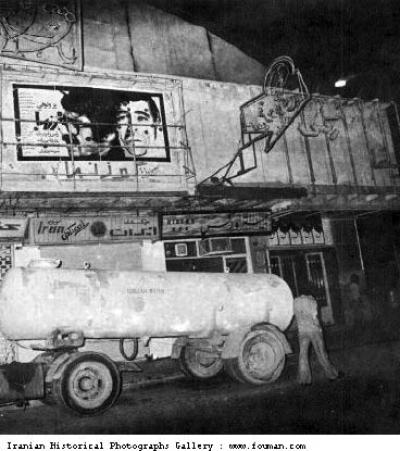
377 people burn alive in a horrible arson at the Rex Cinema in Abadan
The night of August 19 in Abadan started almost as usual. The unusual and quite disturbing thing was the fact that the controversial film Gavaznha was on at Rex Cinema. “I wanted to watch the film that showed the other side of our life, the side that some people are trying to ignore,” says Darab, 35, one of the visitors of the cinema on that day. This film has evoked quite a broad discussion in the Iranian society. However, the film did not result in a heated debate but it resulted in a horrible tragedy.
Today, I am talking with people who are still here or returned to the cinema trying to find survivors or trying to understand what actually happened. People are desperate and there is a lot of mourning and weeping. It is difficult to comprehend what really happened but details provided by the survivors and witnesses can help draw the picture of the tragedy.
At about 8:20, the fire broke out in the Cinema. At that time, there were around 700 people watching the film. “People did not even understand what was happening,” says Belen, 27, one of the survivors. “Somebody shouted fire and people started shouting and running all over the place!” People ran to the door but they could not escape as it was locked. “I tried the door and pushed and pulled but we could not open it so we ran upstairs to the roof trying to escape,” says Ahmad, 31, another survivor of the tragedy.
Some people living nearby ran to the cinema to help people escape the fire, but police officers did not let them do it. “I saw police officers there,” says Kambiz, 46, “and I ran to the door of the cinema but they did not let me go there.
They said everything was under control but I saw it was not! I had a truck and I told the police I could break through the door, but the police officers blocked me for a while and then let go. I wanted to help them but it was too late to open the door and I ran to help those who tried to escape from the roof.” The witnesses report that officials did not do anything. On the contrary, they did not let people help the visitors of the cinema.
Reportedly, firefighter were also unhelpful as when they came (more than 30 minutes after the fire broke out) to the scene there was no water in their tanks. Only an hour later they actually started doing their job. “I did not understand how so they do not help people and do not put out the fire,” says Darab.
During this day, it became known that 377 people burned alive. There were dozens of injured and some missing people. Many people have come to the cinema to help those who might still be trapped (though there is no hope that more people survived). Lots of people are asking police officers how it all could happen, but nobody says anything particular.
In the morning, it was reported that the reason of the fire was the problems with electrical wiring. However, later this day, the Shah government addressed people and claimed that the tragedy in the cinema was a terroristic attack and religious zealots burnt the cinema down with people inside it. The Shah government also tried to put the blame on terrorists to provoke people’s outrage indignation and, at the same time, make people support the measures undertaken by the government.
However, people in the streets do not believe in those claims. “This is all the government as they set the whole thing up and innocent people died,” says Darab. This view is shared by all people in the city and the entire country.
Clearly, it is necessary to get more details and look into the case to understand what exactly happened. However, it is already clear that the actions of the government were inadequate. Police officers did not help people and did not let others help the visitors of the cinema. This is one of the most striking details that suggests that the government is (at least, partially) responsible for the tragedy.
Taking into account inadequate policies of the government that are leading the country nowhere as well as growing dissatisfaction of people in Iran, it is possible to assume that the fire could be a good pretext to start far-reaching repressions against those who will stand up to the Shah regime.
Of course, people need time to live the horror of these two days through. All people want people responsible for that tragedy to be punished as 377 innocent souls perished. I will carry out my own investigation and will try to obtain more information about the events of that night. People have the right to know the truth about the day that could change their lives forever.
Bibliography
Grassian, Daniel. Iranian and Diasporic Literature in the 21st Century: A Critical Study. Jefferson, NC: McFarland, 2014. Print.
Hosseini, Mir M. August, 19, 1978 AD: Fire in Rex Movie Theatre Kills 377. n.d.
Kuehnert, Jasmin S. The Theatre of Horror: From Aurora to Abadan. 2012. Web.
Madella, Thayse. The Otherness in Marjane Satrapi’s Persepolis: The Autobiography and the Graphic Novel as a Subversion of the Western Gaze. n.d.
Naficy, Hamid. A Social History of Iranian Cinema, Volume 3: The Islamicate Period, 1978-1984. Durham: Duke University Press, 2012. Print.
Paköz, Ahu. A Reawakening of Memories in Comic Form: Persepolis by Marjane Satrapi. n.d. Web.
Satrapi, Marjane. Persepolis: The Story of a Childhood. New York, NY: Pantheon, 2004. Print.
Sharma, Priya Raj and Aju Aravind. “Depiction of Islamic Revolution of 1979 in Marjane Satrapi’s Persepolis.” International Journal of Research in Humanities, Arts and Literature 2.1 (2014): 1-8. Print.
“Snap Analysis: Elbaradei, the Muslim Brotherhood, and a Cautionary Note.” Iran News Now 2011.
The Deer. 2014. Web.